Matthew Dicks's Blog, page 33
December 29, 2024
Footwear and foliage
Behold!
And look carefully, lest you miss it…
The Sock Shrub — a rare, unappreciated indoor plant only found in the homes of boys incapable of keeping socks on their feet or tossing them into the hamper.
Instead, you find them in the couch cushions, on their bedroom floor, under the dining room table, and abandoned inside the entryway.
And sometimes, when the forces of the universe align just right, you can find them hanging in a household plant.
Always solo, of course,
Never a pair shall be.


December 28, 2024
My 2024 Christmas haul
Every Christmas, I take inventory of the holiday gifts that my wife, Elysha, gives me.
Some people wish for cashmere sweaters, the latest gadgets, stylish watches, and jewelry. My hope is often for the least pretentious, most unexpected, most nostalgic, quirkiest, most utilitarian little gifts possible, and Elysha never fails to deliver.
When it comes to gift-giving, Elysha is brilliant. More than the gifts themselves, her choices tell me that she knows me.
She sees me more clearly than any other person in my life.
For the past 14 years, I’ve been documenting the gifts she’s given me on Christmas because they are so damn good. Also, it’s an excellent way to recall Christmases of the past.
Every year has been as good as the last, if not better. Her previous gifts have included a signed, first edition copy of a Kurt Vonnegut novel, commissioned paintings of my Boy Scout camp, my grandparents’ farmhouse, my childhood home, my dog, and a shelf containing my books and several other books that mean a great deal to me.
I’ve also received smaller, equally brilliant gifts like a Viewmaster Viewer with family photos, my very own Dundee Award, and schadenfreude mints (“As delicious as other people’s misery”).
Lots and lots more.
She never fails to deliver, including this year.
The best gift of all for 2024 was a commissioned painting titled “Together is the Best Place” that features important landmarks in our relationship, including the locations of our first date, our engagement, our wedding, our honeymoon, and our first two apartments and the home we’ve live in for the last 15 years.
Cleverly designed, it also features mile markers indicating the distances from Connecticut to some out-of-state landmarks (Bermuda and Grand Central Station) and other smaller elements that mean so much to me.
It’s beautiful. Everything I love in a gift:
Unexpected. Nostalgic. Awash in stories and memories. The kind of thing our children will want someday.
Added to this thing of beauty are some other gems, including:
Vintage unopened trading card packs featuring The Simpsons, Close Encounters of the Third Kind, and Mad magazineHand-painted Christmas ornaments of the five pets we’ve owned together.A vintage Skid Row keychainA Shrute Farms Irrigation Room keychainA small device that makes the sad trombone soundPens with embarrassing logos designed to lend out to unsuspecting victimsNew shoesA Shakespeare-themed calendarThe newest Kate Dicmaillo novel“The Twelve Terrors of Christmas” by John Updike (illustrated by Edward Gorey)A combination dart board golf gameA pad of “pep talk” notesThis year was pretty fantastic.
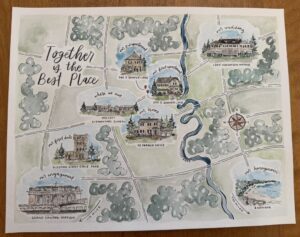
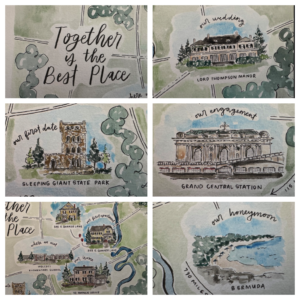
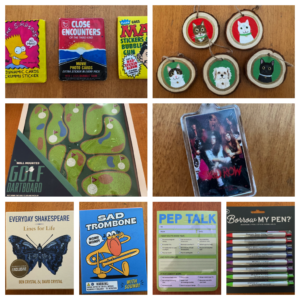
December 27, 2024
You are such a loser
Edgar Allen Poe died penniless and unrecognized for his talent.
“Moby Dick” only sold 3,000 copies in Melville’s lifetime.
Nick Drake’s music didn’t receive wide acclaim until two decades after his death.I could go on.Not to mention all the unrecognized geniuses who might never be recognized. Or might still be recognized years or decades after their death.Winning is not guaranteed. Artists starve. Your work may never be seen by anyone beyond your friends and immediate family. If you decide to pursue a creative career, be prepared to lose.You’ll likely be a loser. Embrace it. Celebrate it.This is what Garfunkle and Oats are signing about. Some of my favorite lyrics from the song include:You’re a loser but a dreamer
You’re tired but you’re strong
You’re going on no evidence
You don’t listen to common sense
You went all in and you were wrongYou are such a loser, good for youAlso:At least you triedAt least you’re not that guy watching from the side
Who thinks he’s doing better cause he wasn’t defeated
When he’s just a non-entity who never competed
You’re the one who’s out there reaching for something greater
And you know it’s better to be a loser than a spectatorThe lyrics sound a hell of a lot better when sung, so go listen.Then bookmark this clip for moments when things are not going well, and you need to be reminded that losing is normal, expected, and a sign that you’re doing something right.
December 26, 2024
Things that annoy me
I have many pet peeves. Most people do, I think.
Most are also smart enough not to publish them for the world to see, but not me!
So here are a few of mine.
If any of them happen to target one or more of your behaviors, please choose one of the following options:
Assume I’m a prickly monster who might someday learn the error of his ways.Recognize that you have an annoying behavior that needs alteration, and thank me for your newfound enlightenment.______________________________________
It annoys me when people can’t own where they grew up. For example:
Comedian Marc Maron was born in New Jersey but spent most of his childhood and teenage years in Albuquerque, New Mexico.
But he likes to say he’s “genetically Jersey.”
That’s not a thing.
Actress Zoe Saldana recently said on a podcast that she grew up in New York but later admitted it was actually New Jersey. But she said she didn’t like telling people that she grew up in New Jersey because she felt like a New Yorker.
Also not a thing.
I was born and raised in a small town about 50 miles south of Boston, but I don’t try to claim Boston (or anywhere else) as my hometown. I grew up in Blackstone, Massachusetts — a town most people have never heard of and even fewer people have visited.
It’s fine. I don’t need people defining me by my childhood home.
______________________________________
It annoys me when actors and filmmakers criticize the use of the word “storytelling” by other actors, screenwriters, and filmmakers.
The rise of the word “storytelling” apparently causes some actors and filmmakers to cringe, while many fellow filmmakers have embraced it to describe what they do.
Being a storyteller, I would seem to have a horse in this race, but that’s not why I am annoyed. I don’t care if they use the word or not, but the visceral response to the word by some actors and filmmakers annoys me.
It’s accurate. They’re telling stories.
I respond similarly when a writer, comedian, actor, or musician describes themselves as an artist, and others respond negatively to the word. You need not apply paint to canvas or chisel to stone to be considered an artist. Making music, writing poems, dancing, and performing onstage are all forms of the creative arts, so if someone wants to refer to themselves as an artist, they should shut up and move on.
If a magician wants to refer to themselves as an artist, I’m okay with it. Mimes and ventrioquists, too.
If you’re not, get over it.
______________________________________
It annoys me when someone answers a question about their life with their astrological sign.
“Well, I’m a Sagittarius, so…”
Also not a thing.
______________________________________
It annoys me when someone says, “I should’ve been a teacher.”
Then become a teacher.
We need more teachers, and teacher certification isn’t especially onerous, especially if you already have a college degree. I know many people who have transitioned from one profession to teaching, so if you should’ve been a teacher, then do it.
Otherwise, stop talking about it.

December 25, 2024
A Christmas memory for the ages
As we prepare to make new Christmas memories this morning, I am reminded of one from 12 years ago, when Clara was three years old and Charlie was still an infant.
I’ll never forget it.
_______________________________________
It’s 9:00 AM on Christmas morning. Things are not going as expected.
After opening a few presents, including three books I had to read aloud before we could continue unwrapping, my daughter told us that she was tired of opening presents and wanted to practice her numbers on my computer.
So now she is sitting at the table, typing the numbers 1-10 and asking how to make 14, 19, 22, and so on.
There is still a pile of presents under the tree, including her best gift, but she wants nothing to do with them.
“When I’m done with my numbers, let’s eat breakfast,” she says. “I’m hungry.”
“Do you want to open presents first?” I ask.
“No!” she says. “No more presents!”
At this rate, these presents may never get opened.
Honestly, has something like this ever happened in the history of humankind?
I adore nonconformity, and her lack of materialism warms my soul, but this is ridiculous.
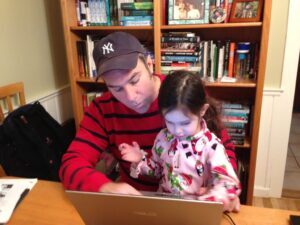
December 24, 2024
Matt’s 2024 Holiday Gift Guide
In the event you have some last-minute shopping to do for a loved one, allow me to offer my annual gift-giving guide to the four best presents that you can gift someone.
I promise you that they are far superior to any cashmere sweater, shiny trinket, or electronic doo-dad that you’re thinking of buying.
TimeThe best gift of all is the gift of time, and it’s not a difficult or expensive gift to give. In the past, Elysha has hired people to cut the grass, rake the leaves, and shovel the driveway, thus returning this precious time to me.
Remove an hour of obligation from my life, and I am a happy man.
Other options include things determining the contents of the boxes in my attic, correcting my multiplication tests for a month, pitching my solo show to theaters throughout the country, or offering to complete any task or chore that I would otherwise be forced to do myself.
Your friend or loved one’s list would be different, of course. Hopefully, it doesn’t include mystery boxes in the attic, but I’m sure you can think of things they would rather not do that you are more than capable of accomplishing on their behalf.
Last night, Clara lamented that she hadn’t bought Charlie a holiday gift. I told her to make coupons for chores around the house, like setting the table and emptying the dishwasher. When it’s his turn to complete the chore, he can turn in the coupon, and she will complete it instead.
The gift of time.
I know this sounds crazy to some people. They say things to me like:
“Matt, I’d rather mow my grass and receive that cashmere sweater.”
“I’d rather correct a mountain of spelling tests and unwrap a brand-new iPad on my birthday.”
“I’m more than happy to shovel my driveway. Give me that new Fitbit/star finder/water purification device I have wanted for months.”
I’m sorry, but I think you’re wrong. It may seem presumptuous to tell you what you or your loved one may want, but trust me. The difference between what you want and what you think you want could not be more different.
I promise you that when you are lying on your death bed, surrounded by all of your material possessions – your stuff – your greatest regret will be the time you could’ve spent doing things. Seeing people. Experiencing the world. At that moment, the gift of time will mean more to you than anything else.
It should mean just as much today. Don’t wait until it’s too late to appreciate it.
Also, it’s very unlikely that you need any more clothing or jewelry or electronics. You could probably do without the device that clips to your belt or fastens to your handlebars or makes imaginary things explode when you click the right combination of buttons.
The thing you should crave — more than anything else — is time.
KnowledgeComing in a close second to time (and in many ways, its first cousin) is the gift of knowledge. Find a way to teach me to do something I’ve always wanted to do but haven’t been able to learn.
Either teach me yourself or find someone who can do it for you.
We all go through life wishing that we could do more. Accomplish more. Achieve more. This gift would allow a friend or loved one to take one small step closer to those dreams.
For me, it’s meant sending Elysha to a cooking or art class. Hiring someone to teach her ukulele.
For Elysha, it meant buying me an hour with a professional poker player or lessons with a golf instructor.
For our kids, it meant hiring professional organizers to help them clean and redesign their rooms yesterday.
In these instances, we walk away with nothing material but something far more valuable:
The gift of knowledge. The acquisition of a skill. A slight improvement in an area that means a great deal to us.
Far more valuable than a pretty scarf or a new gadget. And now that so much has moved online, finding experts in various fields is only a Zoom call away. Charlie is taking guitar lessons via Zoom. My friend is taking personalized yoga classes via the Internet. Bringing a high-quality instructor into your home has never been easier.
My list of things that I want to learn include:
Hitting my driver longer and more consistently.Taking better photographs.Finding and becoming proficient with a digital, virtual whiteboard for Zoom.Designing my YouTube channel to maximize all of the features available to me.I actually sent my production manager to an online class to learn this on my behalf. Now she can do the work for me while simultaneously teaching me.
Huzzah!
Again, your loved one’s list will, of course, be different, but if you find the thing they want to learn, it can be an extraordinary gift.
ExperienceThis one is simple and spoken about often. Want to make me happy? Send me to a Broadway show. Get me tickets to a Yankees game. Bring me to see a comedian who I love. Purchase tickets to a concert.
It doesn’t take much to create a memorable and unique experience for a person. You won’t have anything to show for the experience once it’s done except the memories of the moment, but that is always better than the stuff that clutters our homes.
Studies repeatedly show that money spent on experiences generates far greater happiness than money spent on things. But we know this already.
Right?
An afternoon spent biking with your kids or a weekend with your friends at the beach, or an evening spent sitting beside your wife at a concert is always better than the thing inside the box with the bow.
We’re fools if we think otherwise.
NostalgiaThis is new to my list, but it should’ve been included for a long, long time. In some ways, it’s also a close cousin to the gift of time because it amounts to the past presented in a new and interesting way. A return or a resurrection of days gone by. A dip into the waters of your youth.
Years ago, my workplace birthday buddy surprised me with a lunch with a former colleague who retired a few years ago. For an hour in the middle of my school day, I was able to take a step back in time when my friend was still working alongside me. We ate, talked, and reminisced about the many moments we spent together.
It was my best workplace lunch ever. One of the best gifts that I’ve ever received.
Elysha has been giving me the gift of nostalgia for years, commissioning artists to paint images of the map of my Boy Scout camp, my childhood home, my grandparent’s home, my dog, and a shelf containing all of my books. A couple of Christmases ago, she gave me a Viewmaster Viewer, loaded with images of our family.
These are some of the best gifts that I have ever received. Important places and things reimagined and returned to my life, complete with the memories and joy that they once contained.
Years ago, my workplace birthday buddy surprised me with paintings of two photos I posted online earlier that summer. Small, artistic representations of moments that I remember so well.
An incredible and perfect gift. One that I will treasure forever.
Each time I look at these bits from the past, I am transported back to those days, and I’m reminded of all the happiness and goodness that accompanied these places and people.
These gifts have been so important to me. Reminders of what once was and what will someday be again.
Time, Knowledge, Experience, and Nostalgia.
If you still have someone on your holiday shopping list or you simply want to make someone in your life happy, give one of these a try.
They truly are the best gifts someone can receive, even if they don’t know it yet.

December 23, 2024
Love a real tree
I learned this week that only 14 percent of households purchased a “real” Christmas tree last year, while 80 percent of Americans have an artificial tree.
I can’t believe it. The vast majority of Americans have pretend trees?
It breaks my heart.
Perhaps I feel this way because I grew up in a home with real trees, and the idea of a tree in a box made from PVC and wire depresses me. These trees are probably easier to set up, don’t require watering, and are less expensive over a lifetime, but what about all that is great about a real tree?
Hunting through a Christmas tree lot, seeking the perfect specimen.
Debating the benefits of a Fraser fir over a Douglas pine over a blue spruce.
Hiking into a field of trees with a saw, looking for the perfect tree to kill and drag back to the car?
And what about the differences in trees from year to year that give them personality, character, and memorability?
What about the creativity and ingenuity required to wrestle the tree into the house, shave an inch off the bottom to make it fit, and cover up an unexpected bald spot with a clever assortment of ornaments?
Not to mention some of the unexpected delights that come with a real tree…
Last week, as Charlie’s friend entered our home, he said, “Wow! I love the way your home smells! What is that?”
It was the tree.
Years ago, we found a bird’s nest nestled in the tree branches, which was a delightful surprise.
Also, according to most environmental experts, a real Christmas tree is generally considered better for the environment than a fake tree, as growing and harvesting real trees has a lower overall carbon footprint than manufacturing and transporting artificial trees.
It’s hard to imagine that just over 10% of Americans will decorate real trees this year. I am an enormous fan of efficiency and simplicity and seek it everywhere in my life, but sometimes, the more challenging option is the better one.

December 22, 2024
A book about me.
Someone wrote an “authorized biography” about me, except it’s not authorized.
I didn’t even know it existed until yesterday. I found it by accident. Available on Amazon.
It’s weird to stumble upon an authorized biography of yourself that’s existed for almost six months.
An odd and memorable moment in my life.
I purchased it today. Maybe wait until I take a peek before purchasing it yourself. It’s only 54 pages so it may be a slightly expanded version of my Wikipedia page.
assume the photo on the cover is of David Ellington — the author?
The description reads like this:
_________________________________________
Title: Matthew Dicks: The Authorized Biography, Legacy and Life Story of the Author by David L.Ellington
Discover the remarkable life story and lasting impact of Matthew Dicks, the beloved author, teacher, and storyteller. This authorized biography takes you on an inspiring journey through Dicks’ life, from his childhood in Blackstone, Massachusetts to his current status as a bestselling author and renowned public speaker.
Key benefits of reading this book:
This biography is a must-read for fans of Matthew Dicks‘ work, aspiring writers and teachers, and anyone seeking inspiration to live a life of creativity, purpose, and connection.
_________________________________________
I look forward to reading all about me.
I think.
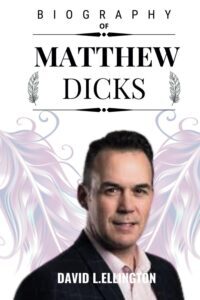
December 21, 2024
You’re not getting old. You are just being dumb. Probably.
People are fond of saying they know they are getting old because they can’t remember people’s names like they once did.
I hear this all the time.
While it may be true that your memory can wane with age, forgetting names is not always about a decline in mental acuity:
You just know more people.
The number of people you know or have known from your twenties to your forties and beyond increases exponentially. Colleagues, neighbors, friends, friends of friends, and spouses of friends constantly come and go. You get to know your dry cleaner, mechanic, landscaper, and hundreds of other people with whom you do business and do business with you.
These people pile up quickly.
Then you get married, and in addition to all of the people in your life, you instantly absorb all of the people in your spouse’s life:
Their family, friends, colleagues, acquaintances, plus all of their spouses, too.
Then you have kids and begin meeting your child’s friends and their parents. You meet the parents of children in your kids’ classes, on their Little Lague teams, and in their Scout troop, dance troops, and origami club. You meet the parents of kids in the Gay-Straight Alliance, the Air Guitar Club, and the Taco Appreciation Society.
Many of these parents have spouses, too, and you meet a bunch.
If you’re religious and attend temple, church, or synagogue regularly, the numbers get even larger.
If you’re serving in the military, the numbers get larger still.
If you work in a profession like education, medicine, or politics and interact with large numbers of people daily, often in an interpersonal way, the numbers can skyrocket.
Then you have those parasocial relationships:
People who know you because they know of you. As an author, columnist, performer, online presence, and overall public figure, I meet many people who know me better than some of my friends, but I have met them zero or maybe one time in my life.
They know the hell out of me, including my name, personal history, and favorite foods, but I have no idea who they are or why I might know them.
So yes, perhaps your memory is failing a bit, but is it possible, if not probable, that you’re forgetting names because you know or have known so many damn people?
I think so.
When you have more information to remember, you have more information to forget.
So stop declaring that you’re getting old. Stop saying those ugly words aloud. I think it’s essential.
Here’s why:
Science tells us that our brain constantly listens to us for clues about how to react and respond to how we feel, think, and live.
Announce that you’re getting old often enough, and your brain will start to believe it and take action in lots of legitimately terrible ways:
Statements like “I’m old” can trigger the limbic system, particularly the amygdala, which processes emotions like fear, anxiety, or sadness. If the statement has a negative emotional charge, it can also elicit feelings of helplessness or stress.The brain’s neuroplasticity (ability to change and adapt) responds to repetitive thoughts and beliefs. If negative self-talk is repeated, it can strengthen neural pathways associated with feelings of decline or inadequacy.If saying “I’m old” evokes worry or self-criticism, it could activate the hypothalamic-pituitary-adrenal (HPA) axis, increasing stress hormones like cortisol. Chronic stress is linked to cognitive decline and reduced brain health.The brain tends to look for evidence that supports its beliefs. If you say, “I’m old,” your brain might focus on physical or cognitive changes reinforcing this belief.Negative self-statements can reduce motivation to engage in healthy behaviors like exercise, socializing, or learning new skills—all of which support brain health. The brain may interpret the statement as a signal to “slow down” or “give up.”When we walk around speaking negatively about ourselves — sometimes for illegitimate reasons — we help to establish, perpetuate, and solidify those beliefs.
If you see aging as a positive, glorious, and wondrous process, speak about getting old as often as you’d like. If talking about aging amounts to positive self-talk in your mind, do it all the damn time.
It makes no sense to me but to each their own.
But if you’re complaining that your inability to remember a name or face is a sign of aging, stop it. It might be, but it’s probably more a function of the amount of data you are constantly inputting on a daily, monthly, and yearly basis.
Instead, maybe say:
“It’s more difficult to remember names now that I’m blessed to know so many people. What a great problem to have.”
That is a statement that your brain would love to hear.

December 20, 2024
Three leadership ideas I can get behind
Advice from Mike Lombardi regarding leadership:
Consider in advance how we will respond, not react, to adversity.Assign an assistant or teammate to monitor our body language or general temperament.Pledge to ourselves that if our team comes up short, our emotions won’t be the reason why.I like this list a lot.
Consider in advance how we’re going to respond, not react, to adversity.
This suggests the creation of “if/then” conditions, which I do quite often.
Constantly, really.
I play out scenarios in my mind, choosing courses of action well ahead of the situation so I am prepared to do battle.
I’d like to think I learned this strategy during my collegiate debating days, but I probably internalized it much earlier while dealing with a childhood filled with verbal confrontations and relentless struggle.
Assign an assistant or teammate to monitor our body language or general temperament.
This is brilliant. As a teacher, it’s a little harder to do unless you have another adult in the classroom working with you, which is sometimes the case when we have a paraprofessional, co-teacher, or other educator working alongside us.
In those cases, I ask for feedback constantly.
The most helpful feedback I’ve ever received about my teaching came when a fellow teacher spent a day observing my instruction and told me what I was doing well and what could be improved.
Being told what I was failing to do or doing poorly was incredibly helpful, but so, too, was learning what I was doing well because it allowed me to do it more often and consistently.
Also, about once per month, I ask my students to review my performance by giving them time to write about what I’m doing well and what needs to be improved.
Looking for honesty in job performance?
Ask a kid.
Along similar lines, I’ve also been told by people that my behavior in meetings is something to behold. Unbeknownst to me, I sigh and grunt and make other expressions of disgust when dissatisfied or annoyed, which can happen quite often in a meeting.
These utterances were unintentional to me, and until they were pointed out, I had no idea they existed. I think I’ve since reduced these unintentional outbursts, but they still happen occasionally because even I notice them now.
Honestly, I don’t mind them too much. I like it when people know where I stand.
I once worked with someone who would position his chair in a meeting so that it faced away from me and in the direction of the rest of the attendees so he could watch their responses to my comments and feedback. Apparently, I am also quite blunt, direct, and pointed in meetings, and he loved watching others react to my statements.
It was, in his words, “Entertaining and hilarious.”
I’ve always known that I’m more open and direct in meetings, and I love saying the things that others are thinking but unwilling to say, but I’d never been cognizant of my impact on those around me, and I never would’ve thought their responses would be so apparent.
Happily, I had a friend who alerted me to all of this.
Pledge to ourselves that if our team comes up short, our emotions won’t be the reason why.
This suggests that we avoid becoming too emotional when our efforts are required to deliver results.
Easier said than done for many, but happily, not for me.
Just this year, I’ve learned — thanks to the insight of a colleague who knows me well — the degree to which I don’t take things personally.
It was quite the revelation for me. I had no idea.
But it makes sense. I’ve written a blog post every day for nearly 20 years. I write magazine and newspaper columns. I stand onstage, telling stories, offering opinions, and speaking with self-assigned authority. I’ve published three nonfiction books that tell people how to do stuff and are filled with my opinions and advice. I appear on podcasts espousing my expertise, and I’ve been the host of two podcasts that do the same.
While the vast majority of feedback on my work is positive, I have my critics, and because of the sheer amount of content I put out, they are — at least at times — quite numerous. While some are thoughtful and even helpful, many, if not most, are scathing, cruel, pointed, insulting, and demeaning.
Sometimes even threatening.
Often anonymous, too, because cowardice is in great supply these days.
But I never care.
I don’t take any of it personally. I never react emotionally. It never ruins my day, spoils my mood, or slows me down. It’s probably a combination of confidence and perspective:
When you’ve survived homelessness, jail, a violent, armed robbery, two near-death experiences, and the last name Dicks, an army of online trolls amount to a flea on an elephant.
If I come up short in achieving a goal — and I often do — it’s never because my emotions got in the way. I’ve either failed in my strategy, run out of time, or didn’t do what I need to do,
Lombardi’s list is good, and it likely appealed to me simply because I am already adhering to its tenets.
If his list had instead read:
Show deference to authority.Dress professionally at all times.Eat broccoli while listening to Steely Dan.… I may not have been so enthusiastic.
[image error]



